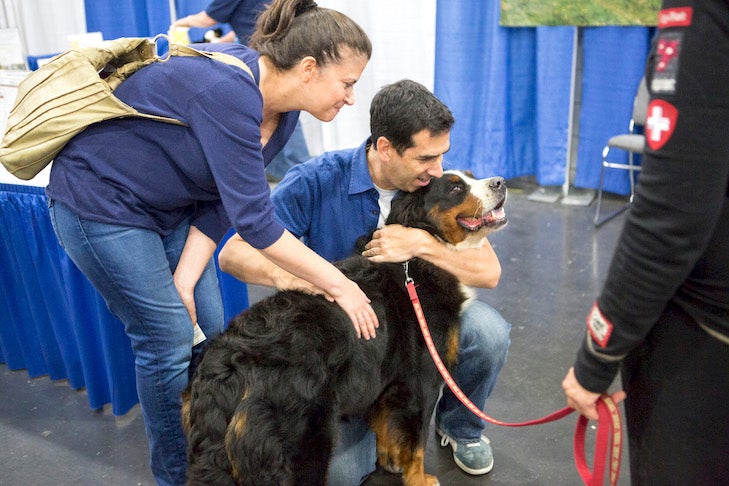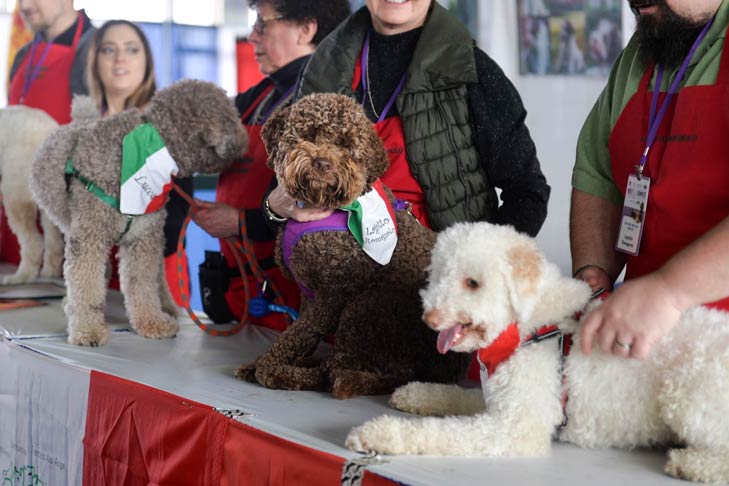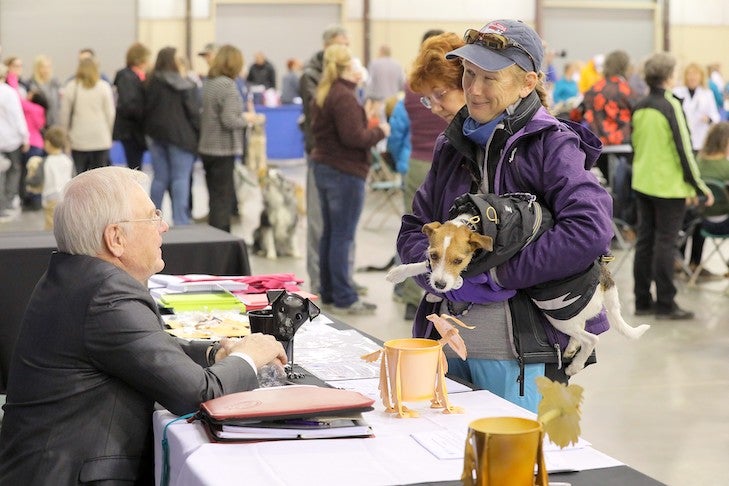
Working members are every club’s greatest asset. Yet most clubs haven’t changed their style of recruiting new members in decades. That’s a problem when longtime members are getting older and many newbies in the sport mistakenly think they can learn all they need to know by chatting on Facebook.
Thankfully, we have smart dog people of all ages who want to succeed in the sport and recognize the value of joining a club to help reach their goal.
So Why Join a Club?
Remy Smith-Lewis, 29, of Oakland, Calif., began showing dogs at the age of 10. He joined his regional Portuguese Water Dog club while attending college, and then joined the local all-breed kennel club in 2013, at the age of 23. As it turns out, it happened to be one of the largest, most prestigious clubs in the country, whose annual cluster draws daily entries in the thousands.
“Clubs are important. We can’t all just take. I saw joining the club as a great opportunity to learn from some great people,” says Smith-Lewis. He knew he wanted to be a breeder, and asked himself how he could make an impact in the sport. Smith-Lewis concluded that learning from seasoned breeder-exhibitors was the answer.
When he expressed his interest to the longtime show chair, the response was immediate and positive.
Susan McSherry of Marble Falls, Ark., began showing in conformation in 2014, when she was in her 60s, although she had been surrounded by purebred dogs since childhood, and participated in a multitude of activities including obedience, bird hunting, and working with the famed Penn/Mary Del English Foxhounds for decades.
“I actually began looking for clubs before I started showing. I knew I was getting an adult, AKC champion and wanted to get hooked up with all the appropriate groups,” she says. “I knew that my dog, a Belgian Malinois, could be competitive in Dog Sports and I wanted to see where he could take me. I started with conformation, which the dog already knew, and branched out from there. In horses, you try to pair a green rider with an experienced horse. I intended to make my life easier by putting this idea into practice in my new endeavor. Do what the dog knows and learn the rest together.” She started off with her parent club and local kennel club, then added other clubs as she discovered other Performance disciplines. “I am a huge believer in supporting the organizations that make it possible for me to participate in activities I enjoy,” she says.
McSherry, too, was warmly received by the clubs… once she found them! More about that later.
Putting Volunteers to Work
Volunteering is a two-way street. Clubs may have jobs to offer but members must be of the mindset to want to make club work one of their priorities. Some folks will join a club, bake brownies to take to a monthly meeting, and maybe offer to sell catalogs one morning of a show weekend. That could be the extent of it.
“A lot of people seem to be partially committed,” observes Smith-Lewis. “They’ll give you a couple of hours one day of a three-day show weekend.” Of course, be appreciative of their limited availability and hang on to them. But others want to be fully committed, and those are the people that clubs need to engage early and keep motivated for long-term success. Smith-Lewis blocks off Thursday and Friday in his calendar every year. He is the club’s Transportation Chair, which involves picking up a huge panel of judges from two major airports, Oakland and San Francisco, and coordinating their return. Often, he sees little of the actual show.

Smith-Lewis’ club has also wisely availed itself of his hi-tech skill set and he has helped create a series of online job descriptions that all members can access.
McSherry says her offers to volunteer were generally well accepted but at other times came about through necessity. “Being a post [in obedience] was always accepted. Being a set-up and clean-up person was always willingly accepted. Food provider? Always accepted. For other jobs, if someone couldn’t or didn’t show up, I was conscripted. I quickly noticed that some members only want to table steward. Some only want to keep time [in obedience]. Some only want to wear badges and schmooze with judges,” she says. “While I understand the attitude, new people need to be mentored in all of the necessary jobs so that clubs have a deep field of volunteers to draw from.”
McSherry has organized regional specialties for her parent club, and worked as assistant trophy chair. In her local all-breed club, she has served on the Board of Directors (two terms), and as a match chair, match secretary, newsletter editor and steward.
How Can Clubs Do Better?
Many clubs request feedback from exhibitors to improve the quality of their annual shows. They are far less inclined to ask their members how the club is serving their interests, and what can be done to energize the organization and bring new people into the fold. Too many clubs get defensive at the very suggestion of soliciting such feedback, yet doing so could be incredibly valuable to their future well being. Smith-Lewis and McSherry needed little prompting to weigh in.
Be Discoverable!
“Clubs are too hard to find,” says McSherry. “Someone who did not know that kennel clubs existed would be hard-pressed to find out about them. I have good investigative skills and still had to dig pretty deep. Then, once you find the groups, the public listings of contacts and officers are often outdated.” It behooves all clubs to keep this information current on all applicable websites and social media.
Same Old, Same Old?
Take a long hard look at your list of volunteers and jobs. Are the same people always in the same position? “Give members a job, and give them variety,” says Smith-Lewis. “Give them ownership and responsibility. It’s a matter of trust, like selling a promising new exhibitor a nice puppy. Don’t have them do catalog sales year after year.”

Mixing it Up
McSherry suggests adding some new positions, whether formal or not. “How about a Newbie Concierge, a designated person to whom new folks are directed for education, to explain how things work? A Public Information Officer? A Social Media Coordinator? Give members special projects and let them run with it. Let your members shine. When the club has been invited to make a public appearance, feature your members. If a member promotes an activity that is newsworthy, let them share—or even have—the spotlight.”
Often, jobs don’t rotate in a club because everyone is a volunteer and personalities get in the way. McSherry is in favor of term limits. “That’s right. I said it. No one wants to challenge the powers that be since they are afraid of hurting feelings. But what will happen to your club if the officers for the past 20 years are no longer there? Have you been preparing understudies to fill those positions? Even if your club has only four members, take turns with all the jobs, at least on paper. Members with wasted talent will eventually become bored if they are not engaged in a manner that is of interest to them,” says McSherry.
Become More Senior-friendly
While our sport, on the whole, appreciates the importance of attracting young people, are clubs doing enough for new members of an older vintage? Many empty-nesters discover the fun of showing dogs as they search for a new hobby. With more available time and discretionary income, dog showing and club volunteer work are a great fit for them. McSherry adds that “seniors are a treasure trove of skills and experience. What we do not know about dogs may be balanced by all the other amazing things we have learned over decades of our professional and personal lives.”
However, to benefit from the gifts that older members can contribute, clubs may need to become more flexible. Little things, like meeting times, need to be considered. McSherry no longer belongs to a club based several hours from her home because of its rule that members must attend a minimum number of meetings—held at night—in order to enjoy the benefits of membership. “There was no flexibility built into the rule,” she says. “I asked if they would increase the volunteer hours as a trade-off for night meetings, or allow members to attend meetings via Skype, or schedule a few weekend meetings a year, to accommodate those older members who would rather not drive many hours at night. The club executive wouldn’t budge.” McSherry averaged about 100 volunteer hours a year to that club, plus food and donations.
A Spirit of Accommodation
With so many demands on our time today, and all of us multi-tasking, we’ve got to get inventive to grow our clubs.
Would meetings on Skype motivate busy professional handlers to join their local kennel club? Would term limits rotate club jobs and energize members without the worry of hurt feelings? Challenging times call for creative solutions.

